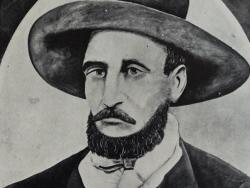
Published date
22 January 1837
Piet Retief completes the manifesto that sets out the reasons why the Voortrekkers are leaving the Cape Colony. It is published in English in the Graham's Town Journal on 2 February 1937. To understand the mass emigration of the Afrikaans frontier farmers (Afrikaners) out of the Cape Colony it is important to look at the circumstances in the Cape at that time.
On the one hand, there was an ongoing conflict between these farmers and the Xhosa inhabitants on the frontier, as well as growing resentment between the farmers and the British colonial authorities. The farmers argued that because the colonial government limited the activities of the Boer commandos, and refused to let them handle the law and order on the frontier themselves, they could not protect themselves from Xhosa attacks. Furthermore, they blamed the government of not giving them any financial support in the frontier wars and other confrontations with the Xhosa.
The conflict on the frontier was an indication of how important land conflict had become in the region. Both the Xhosa and Afrikaner farmers needed land to support themselves and their livestock. Land prices had also increased considerably during the 1820s and 1830s. This meant that the younger generation could not afford their own pieces of land, and this problem would only grow. Another reason for the Great Trek was a lack of labour because of the government passing the 1828 Ordinance 50, which outlawed slavery.
This Ordinance has been called 'The Magna Carta of the Khoikhoi', as it determined that the "Khoikhoi" was equal to White people and did not need to carry passes anymore. Not many of these farmers owned slaves, but some did suffer losses with the emancipation of slaves, like Trek leader Gert Maritz. For the frontier farmers, the Ordinance meant less strict control over their servants and farm labourers. It also meant that many labourers left the farms, and many of them formed moving gangs. These plundering gangs were the first grievance Retief mentioned in his manifesto.
Many farmers believed that in the country's interior, there was land in abundance (and therefore cheap land), and most importantly, no British government. Between 1834 and 1840 about 15 000 Afrikaners left the Cape Colony permanently. They called themselves 'emigrants' and their mass-trek an 'emigration', but in the late 19th century this mass-movement became known as the Great Trek and the emigrants Voortrekkers.
On the one hand, there was an ongoing conflict between these farmers and the Xhosa inhabitants on the frontier, as well as growing resentment between the farmers and the British colonial authorities. The farmers argued that because the colonial government limited the activities of the Boer commandos, and refused to let them handle the law and order on the frontier themselves, they could not protect themselves from Xhosa attacks. Furthermore, they blamed the government of not giving them any financial support in the frontier wars and other confrontations with the Xhosa.
The conflict on the frontier was an indication of how important land conflict had become in the region. Both the Xhosa and Afrikaner farmers needed land to support themselves and their livestock. Land prices had also increased considerably during the 1820s and 1830s. This meant that the younger generation could not afford their own pieces of land, and this problem would only grow. Another reason for the Great Trek was a lack of labour because of the government passing the 1828 Ordinance 50, which outlawed slavery.
This Ordinance has been called 'The Magna Carta of the Khoikhoi', as it determined that the "Khoikhoi" was equal to White people and did not need to carry passes anymore. Not many of these farmers owned slaves, but some did suffer losses with the emancipation of slaves, like Trek leader Gert Maritz. For the frontier farmers, the Ordinance meant less strict control over their servants and farm labourers. It also meant that many labourers left the farms, and many of them formed moving gangs. These plundering gangs were the first grievance Retief mentioned in his manifesto.
Many farmers believed that in the country's interior, there was land in abundance (and therefore cheap land), and most importantly, no British government. Between 1834 and 1840 about 15 000 Afrikaners left the Cape Colony permanently. They called themselves 'emigrants' and their mass-trek an 'emigration', but in the late 19th century this mass-movement became known as the Great Trek and the emigrants Voortrekkers.
References
Cameron, T. & S. B. Spies (eds.) (1986). Nuwe Geskiedenis van Suid-Afrika in Woord en Beeld, Kaapstad & Pretoria: Human & Rousseau.|Wallis, F. (2000). Nuusdagboek: feite en fratse oor 1000 jaar, Kaapstad: Human & Rousseau.